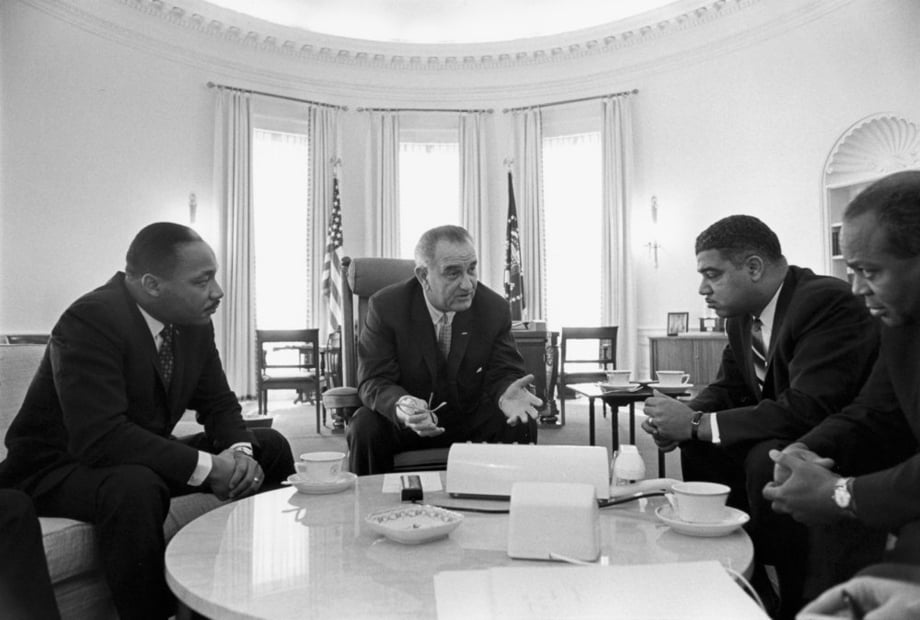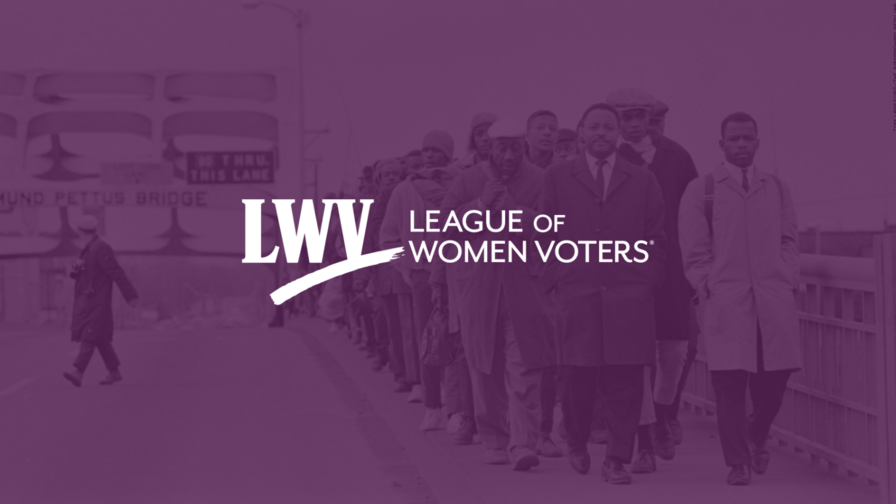Celebrating the Coalition Power & Activism that Launched the Voting Rights Act
This year, we celebrate the 58th anniversary of the Voting Rights Act of 1965, a historic law that protected the right to vote for American citizens of all racial and ethnic backgrounds. As we reflect on this important law, we must acknowledge the hard work of diverse coalitions and dedicated activists who fought tirelessly for its passage. Their unwavering commitment to fairness and justice moved our country towards a more inclusive and democratic society.
In the early 1960s, America faced widespread racism and efforts to prevent Black and brown communities from voting. Many citizens, especially Black Americans, were practically or literally denied their right to vote.
It was clear that immediate action from the federal government was needed to protect this fundamental right and dismantle the obstacles that prevented equal participation in our democracy. To overcome racist challenges, a remarkable coalition was formed, bringing together individuals and groups from various backgrounds, races, and political beliefs. Leading this effort were civil rights organizations like the Student Nonviolent Coordinating Committee (SNCC) and the Southern Christian Leadership Conference (SCLC).

President Lyndon B. Johnson, who signed the Voting Rights Act of 1965 into law, with civil rights leaders Dr. Martin Luther King, Jr. (SCLC), Whitney M. Young, Jr. (National Urban League), and James Farmer (Congress of Racial Equity).
Activists Leading the Way
The leaders and activists who spearheaded this movement were courageous individuals who risked their lives to bring about change. Stokely Carmichael, the charismatic leader and chairman of SNCC, played a significant role in advocating for civil rights and voting rights, leading the charge for justice and equality. The Reverend Dr. Martin Luther King, Jr., a powerful leader and co-founder of the SCLC, inspired millions with his organizing, speeches, and sermons. Fannie Lou Hamer, a determined sharecropper and leader of the Mississippi Freedom Democratic Party, fearlessly challenged the exclusionary practices of the Democratic Party at the 1964 Democratic National Convention. Their unwavering determination and sacrifice became the foundation of the movement to implement what would become the Voting Rights Act of 1965.
One pivotal moment that sparked national attention on voting rights was the historic march from Selma to Montgomery, Alabama in 1965. Led by Dr. King and civil rights activists, including future US House Representative John Lewis, the peaceful protestors faced violent attacks from state troopers on what became known as Bloody Sunday. The shocking images and public outrage that followed brought voting rights to the forefront of national consciousness and rallied support for legislative action.
Read About the Women of Bloody Sunday
The Voting Rights Act of 1965
After the outside pressure became too much to ignore, on August 6, 1965, President Lyndon B. Johnson signed the Voting Rights Act into law. It was a monumental achievement for both the civil rights movement and the country. The law banned unfair practices like poll taxes, literacy tests, and other barriers that had been used to suppress minority votes. It also established federal oversight in states with a history of voter discrimination, ensuring fair and equal access to the ballot box.
The Voting Rights Act of 1965 transformed American democracy, setting a powerful example for protecting and expanding voting rights. However, the fight for equal access to the ballot continues today. Recent challenges, including the Supreme Court's 2013 decision in Shelby County v. Holder, which weakened key provisions of the act, emphasize the need for ongoing vigilance.
As we commemorate the 58th anniversary of the Voting Rights Act, let us honor the bravery and dedication of diverse coalitions and passionate activists who worked tirelessly for its passage. Their unwavering commitment to justice and equality has shaped American history. Let us draw inspiration from their achievements as we continue the work of building a more inclusive, fair, and participatory democracy for all.
Take a stand for voting rights today — let your representatives know you support the expansion of voting rights.
The Latest from the League
Ten years ago, the Voting Rights Act's power to prevent election discrimination was undermined by the Supreme Court decision in Shelby County v. Holder.
The ruling's impact is still felt, as some politicians attempt to limit the electoral power of specific communities, such as Black and brown voters.
On March 7, 1965, hundreds of civil rights protestors attempted to march the 50 miles between Selma and Montgomery, Alabama to protest the suppression of Black votes. In this blog, we honor the work of the women who participated in this historic act.
As we celebrate Black history and commemorate many great leaders — both the known and unsung heroes of our time — we must also remember that the struggle to protect voting rights continues.
Sign Up For Email
Keep up with the League. Receive emails to your inbox!
Donate to support our work
to empower voters and defend democracy.





